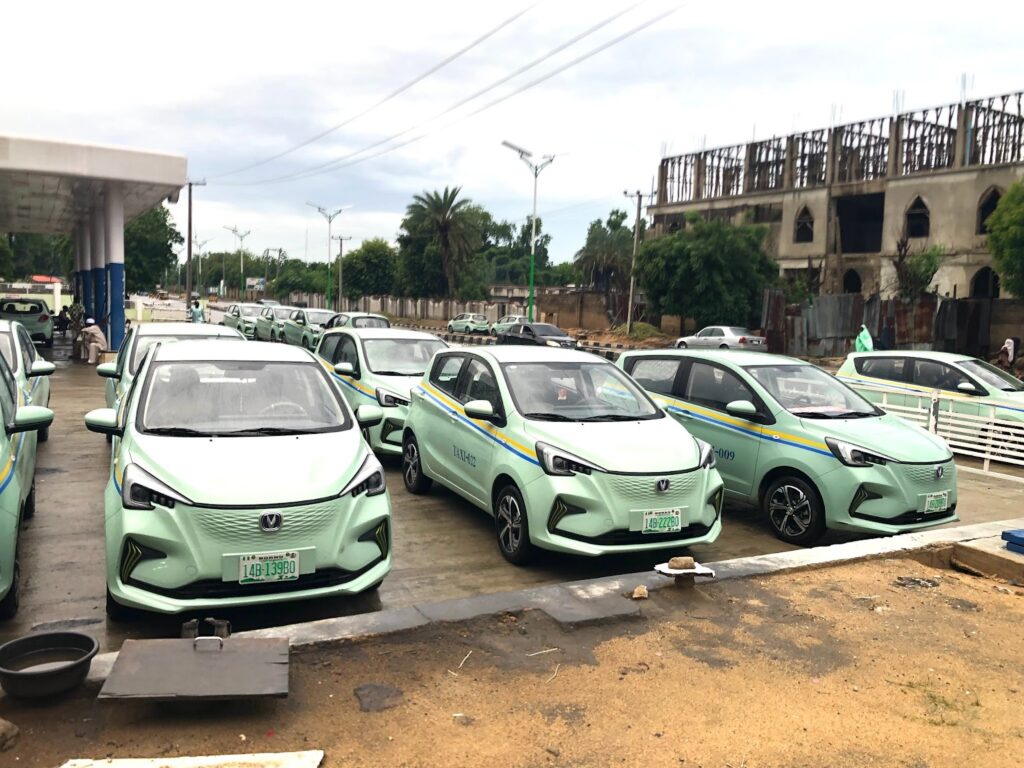In Maiduguri, northeastern Nigeria, the bustling Post Office area has become the hub for a quiet revolution. Once a rarity, electric cars now transport passengers to some locations in the metropolis, including Polo, Damboa Road, Custom, and Abbaganaram.
Among the daily commuters is Hadiza Abdullahi, a resident who has embraced this new mode of transportation. As she waits for her ride to work on a busy Monday morning, Hadiza reflects on the benefits she has enjoyed since making the switch. “The electric car is much less expensive, doesn’t pollute the environment, and is more convenient than conventional cars,” she says. Hadiza hopes to see more electric cars on the road, contributing to a cleaner and more sustainable environment in Borno State.
Similarly, Lawan Bukar Maigana, another Maiduguri resident, has used these electric cars for five months. He commends their comfort and affordability. “Before, I spent at least ₦20,000 monthly on transportation. Now, I only spend about ₦10,000,” he explains, highlighting the significant savings these electric vehicles offer.
Lawan adds that the cars’ climate-friendly nature, with zero emissions, reduces climate change risk. However, he also notes the need for more of these vehicles and suggests the government reintroduce rechargeable bikes, which were recently banned. “If possible, the government should increase the number of electric cars and extend their routes within the metropolis. This would allow more people to save money on transportation,” he added.
How it started…
The driving force behind this initiative is the Borno state government, which has recognised the need to alleviate its citizens’ financial burden and address pressing environmental concerns. On Dec. 11, 2023, the state government launched 50 electric taxis.
The move was designed to create jobs but also offer a sustainable alternative in the wake of rising pump prices due to the removal of fuel subsidy in Nigeria while championing eco-friendly transport.
“Unlike conventional cars that emit carbon dioxide and contribute to global warming, these electric cars are smokeless. This is why the state government initiated the idea of introducing smokeless electric cars,” said Usman Aliyu, an environmental scientist and the director-general of the state’s Agency for the Great Green Wall.
“These vehicles are already making transportation easier across the state. By doing so, the government aims to achieve two goals simultaneously: providing a cost-effective and environmentally friendly solution.”
From an economic perspective, the shift to electric cars is equally promising. Jidda Abdulrahman Ajayi, an economist at the University of Maiduguri, points out that the government’s subsidy has made these cars affordable during challenging times. “A litre of petrol costs up to ₦1,000, but with just ₦100, you can travel to various locations in these electric cars,” he says. Jidda adds that reducing fuel dependency saves residents money and contributes to a more stable local economy. He believes the initiative could pave the way for further investments in renewable energy, creating jobs and boosting the region’s economic resilience.
On the road…the bumps
According to Gambo Maina, the chairman of Taxi Drivers in Borno State, drivers usually take their vehicles to the charging station every evening, leaving them to charge overnight. Once fully charged, these electric taxis can operate for an entire day without recharge.
Additionally, he noted that the maintenance of these vehicles also presents fewer challenges than traditional taxis, with the most common issue being tire-related, handled by a dedicated mechanical workshop located at Borno Express Motor Park.
However, despite the positive reception, challenges remain. Muhammad Adam, one of the electric car drivers, recalls struggling to find charging points, which hindered his ability to operate efficiently. “For smooth movement, we need more charging stations,” he says.
Jidda echoes this concern, noting that the limited number of charging points and the three-hour charging time might delay daily operations. In response, Usman Aliyu confirmed that the government is aware of this issue and has plans to increase the number of electric cars and charging stations across the state.
Maina told HumAngle that at least six new charging points are expected to become operational soon, located at Terminus, Baga Road, Tashan Bama, Bosco, AP Filling Station, and the Borno Express area. Despite these efforts, he stated that the stations need constant power supply.

The ride ahead
Muhammad Adam believes that introducing electric cars has elevated Maiduguri’s status on both the national and global stage, making it one of the pioneers in adopting electric vehicles. “These cars have fewer challenges compared to conventional cars. They only need the power to charge and have minimal maintenance costs,” he explains.
For Usman Aliyu, the future of Borno State lies in a transportation system dominated by electric cars, contributing to cleaner air and a healthier population. He envisions a future where transportation in Borno relies entirely on electric or solar power, particularly given the high petroleum prices. He intends to discuss the model with the state’s Commissioner of Transportation and the Ministry of Environment.
Jidda agrees, adding that the economic benefits could be far-reaching, especially if the initiative sparks broader interest in green technologies.
This report was produced under the 2024 HumAngle Accountability Fellowship.
Support Our Journalism
There are millions of ordinary people affected by conflict in Africa whose stories are missing in the mainstream media. HumAngle is determined to tell those challenging and under-reported stories, hoping that the people impacted by these conflicts will find the safety and security they deserve.
To ensure that we continue to provide public service coverage, we have a small favour to ask you. We want you to be part of our journalistic endeavour by contributing a token to us.
Your donation will further promote a robust, free, and independent media.
